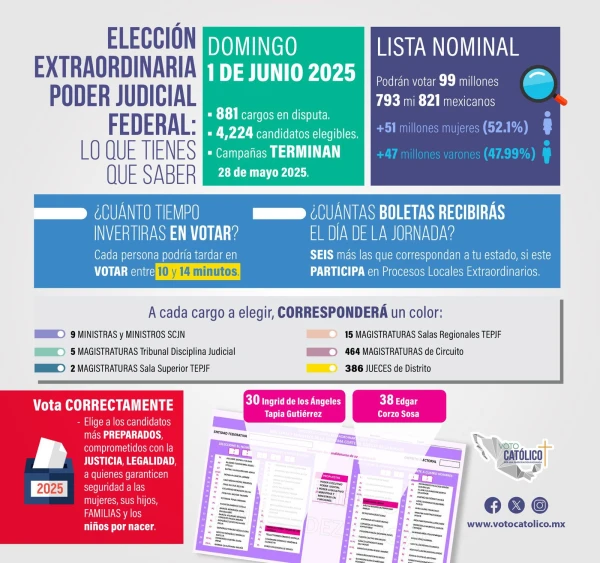This Sunday, June 1, Mexico will live a historical fact: for the first time, citizens will directly choose judges, magistrates and other judicial officials in elections for the Judiciary.
However, this reform has not been exempt from controversy. From its early phases, it was hard questioned by different sectors of society, including the Catholic Church, which warned about the risks that this transformation implies for democracy and the division of powers in the country.
Receive the main news of ACI Press by WhatsApp and Telegram
It is increasingly difficult to see Catholic news on social networks. Subscribe to our free channels today:
What changes with judicial reform?
These elections are the result of the constitutional reform to the Judiciary promoted by then President Andrés Manuel López Obrador and his party, Morena. The reform was approved in September 2024 by the Congress of the Union, mostly made up of members of Morena.
Among the main novelties of this reform is the direct election of 881 judicial positions at the federal and local level. Among the positions to be renewed are ministers of the Supreme Court of Justice of the Nation (SCJN), magistrates of the Electoral Court and District Judges.
In addition, the Court of Judicial Discipline will be created, composed of five judges responsible for investigating and sanctioning possible undue behaviors within the Judiciary.
Rosa Icela Rodríguez, Secretary of the Interior, reported that the participation of more than 100 million voters of legal age is expected, of a total population of approximately 130 million people.
How will you vote?
Unlike traditional political elections, this time each voter will receive six ballots of different colors, corresponding to the different dispute positions.
According to the National Electoral Institute (INE), a list of nominations divided by sex will be presented on each ballot. The voter must write the numbers of the chosen candidates in the dotted boxes, respecting the number of charges to be selected.
For specialized judges in areas such as Civil, Criminal or Administrative, the candidacies will be differentiated by colors according to their specialty, and the voter must choose a candidate for each category.

Catholic Church signs
Since the beginning of this reform, the Mexican Episcopate Conference (CEM) expressed its opposition. In a message dated October 23, the bishops warned that the reform could “put at risk the balance of powers that supports our democratic structure.”
In addition, they called for the reform to be “more widely discussed and analyzed by the Legislative Power”, something that finally did not happen.
Criticism of judicial independence
Dr. Rafael Estrada Michel, director of the Law School of the Pontifical University of Mexico and director of the CEM Observatory, in statements for ACI Press, severely questioned the model of direct election of judges. As he explained, this mechanism could facilitate the intervention of political actors and power structures in judicial processes.
Although he acknowledged that this practice already exists, he warned that “the situation will undoubtedly be aggravated, with luxury of cynicism and prostration in the coming years.”
The expert cited the expression in Latin “Anger is short“, Which means” anger is a brief madness “, to alert that “This bad reform product of anger and revenge cannot be sustained more than a decade, as happened with socialist education and with bank nationalization.”
“The bad thing is that its pernicious effects will feel beyond the middle of the 21st century. Think, simply, in the criminal disassembly of the judicial career, which had cost 30 years to consolidate,” said Dr. Estrada Michel.
He also warned that this reform “will make nugatory the division of powers, judicial independence and constitutional justice” and in terms of the creation of the new disciplinary body said that its function will be that “no judge of the Republic dares to question the constitutionality or conventionality of a law or a decree of the Executive, under penalty of dismissal, disqualification and even prison.”
This whole situation, he concluded, will generate a lack of judicial independence that “it does not serve either victims or prosecuted, because with it access to truth becomes impossible, and everything ends up being simulation and alibi.”
Should a Catholic vote?
Luis Antonio Hernández, responsible for the Mexican Platform Catholic vote, which analyzes the positions of Mexican politicians regarding the values of the Church, told ACI Press, that “participating in the political life of the country, as well as in the transcendent decisions of the community, will always be worth it, in addition to being a civic duty of every citizen of good will”.
He explained that, although in this process “they managed to filter applicants without sufficient experience for these positions, even some with dangerous links or background,” there are other ideal candidates for the position, so he pointed out that “one of the main obligations of committed citizens must be closed just those applicants whose career and reputation does not guarantee an efficient administration of justice.”
Hernández said that, to vote correctly, a Catholic – and in general anyone in good faith – “must choose the most prepared candidates, committed to justice and legality, who guarantee greater legal certainty to women, their children, families and children to be born.”

